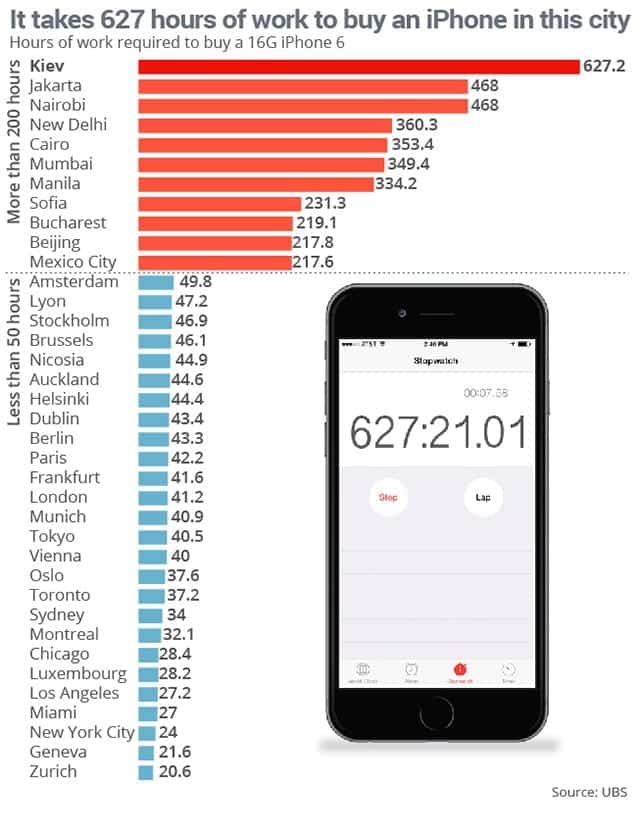This is How Many Work Hours Will Be Required In These Cities To Buy An iPhone 6
How long would it take you to save enough money to buy an iPhone 6? The answer to that question depends primarily on where you live. On one hand, despite of its high price many of the Americans do not think twice before buying an iPhone, on the other hand, its a premium product beyond the reach of most of the workers in other countries.
For instance, according to the Prices and Earnings 2015 report released by UBS this week, it will take the average worker in Kiev about 627 hours (which is more than 13 weeks on the job to hit the mark) to pay for a 16GB iPhone 6, while it would take 468 hours in Jakarta and Nairobi. UBS took the average price paid by the survey participants in each city and where possible took into consideration Apple’s official local retail price as well, in order to calculate the price of the 16GB iPhone in each city. The cost was then divided by the net hourly wage for 15 professions.

At the same time, in wealthy cities like Zurich (20.6 hours) and New York (24 hours), the average worker earned enough capital for a new 16GB iPhone 6 in just three working days or less.
The data shows that workers in several large European cities, like London (41.2 hours), Frankfurt (41.6 hours) and Paris (42.2 hours), as well as workers in Tokyo (40.5 hours) and Hong Kong (51.9) earned enough for the iPhone 6 in just over one working week.
All these data makes sense when we look at the worker pay. According to UBS, for example, in Kiev, the gross hourly pay averages $1.93, which is 21 times lower than in Zurich, where workers make $41 per hour on average. When we index wage levels (using New York wages as the baseline with an index of 100), we can see that wages are highest in Zurich, Geneva, Luxembourg and New York (indices of 131.5, 130.3, 106.4 and 100, respectively) and lowest in Kiev, Jakarta, Nairobi and New Delhi (6.1, 6.4, 6.7 and 7.6, respectively).
The domestic purchasing power, which is gross hourly pay divided by the cost of a basket of commonly consumed goods (excluding rent) also explains why workers in many areas cannot afford luxuries. Using New York as the baseline (index of 100), we can see that workers in Luxembourg, Geneva and Zurich have the highest domestic purchasing power (indices of 147.1, 122.6 and 120.8 respectively), while workers in Jakarta, Nairobi , Kiev and Cairo have the lowest 11.7, 13, 16.5 and 16.5 respectively).
UBS did a survey of the prices on 122 goods and services (an estimated average monthly consumption of a three-person European family) to make this report, along with the earnings for 15 professions in 71 cities around the world.
